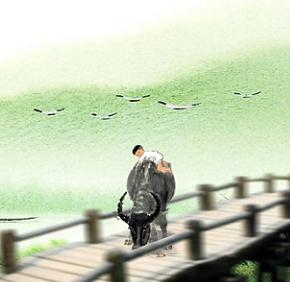中国历史故事英文版

A well-known poem by Tang Dynasty writer Du Mu tells of a sad scene in early April: "rains fall heavily as Qingming comes, and passers-by with lowered spirits go." Qingming Day, the traditional tomb-sweeping day, falls on April 4-6 each year. It is a time for remembering loved ones who have departed. People visit their ancestors' graves to sweep away the dirt.
唐朝著名诗人杜牧有一首著名的诗,描述了四月初令人伤感的一幕场景:“清明时节雨纷纷,路上行人欲断魂。”每年4月4-6日左右的清明节是传统的扫墓的日子。在这一天,人们祭吊去世的亲人,到先人的坟头上扫墓。
Its origin dates back to the Spring and Autumn Period. Jin prince Chong'er ran away from the country with his supporters due to persecution. They were homeless for 19 years and things got so bad that Chong'er began to starve to death. One of the prince's faithful followers, Jie Zitui, cut a piece of muscle from his own leg and served it to his master. Chong'er was saved and, in 636 BC, he took back the throne.
清明节可以追溯到春秋时代。晋国公子重耳因受到迫害,率其支持者出逃。19年间,他们居无定所,漂泊四方。一次,他们的处境相当窘迫,重耳饿得快不行了。这时,忠心耿耿的介子推从自己的腿上割下一块肉献给了重耳,公子重耳得救了。公元前636年,他夺回了王位。
He rewarded the officials who had stayed loyal to him but he forgot about Jie Zitui. By the time Chong'er remembered him, a heartbroken Jie Zitui had traveled deep into the mountains. Chong'er wanted to persuade Jie to come home, so he had the hills set on fire. But Jie was later found beside a large tree, with his old mother on his back. Both were dead.
即位之后,重耳对支持者大加封赏,却忘记了介子退。等到想起这位忠臣时,伤心的介子推早已遁入山林深处。重耳想逼他回来,所以就大火焚山。后来,在一棵大树旁边发现了背着老母的介子推。两人都被烧死了。
Saddened by the tragedy, Chong'er ordered that fires could not be lit on the day of Jie Zitui's death. From this comes Hanshi Day, or Cold Food Day. People visited Jie Zitui's tomb the next day to pay their respects. Over time, Hanshi Day was replaced with tomb-sweeping day.
重耳悲痛欲绝。他下令,在介子推的忌日不准生火。寒食节即来源于此。寒食节的次日,人们到介子推的坟头上致敬。

唐朝著名诗人杜牧有一首著名的诗,描述了四月初令人伤感的一幕场景:“清明时节雨纷纷,路上行人欲断魂。”每年4月4-6日左右的清明节是传统的扫墓的日子。在这一天,人们祭吊去世的亲人,到先人的坟头上扫墓。
清明节可以追溯到春秋时代。晋国公子重耳因受到迫害,率其支持者出逃。19年间,他们居无定所,漂泊四方。一次,他们的处境相当窘迫,重耳饿得快不行了。这时,忠心耿耿的介子推从自己的腿上割下一块肉献给了重耳,公子重耳得救了。公元前636年,他夺回了王位。
即位之后,重耳对支持者大加封赏,却忘记了介子退。等到想起这位忠臣时,伤心的介子推早已遁入山林深处。重耳想逼他回来,所以就大火焚山。后来,在一棵大树旁边发现了背着老母的介子推。两人都被烧死了。
重耳悲痛欲绝。他下令,在介子推的忌日不准生火。寒食节即来源于此。寒食节的次日,人们到介子推的坟头上致敬。
A well-known poem by Tang Dynasty writer Du Mu tells of a sad scene in early April: "rains fall heavily as Qingming comes, and passers-by with lowered spirits go." Qingming Day, the traditional tomb-sweeping day, falls on April 4-6 each year. It is a time for remembering loved ones who have departed. People visit their ancestors' graves to sweep away the dirt.
Its origin dates back to the Spring and Autumn Period. Jin prince Chong'er ran away from the country with his supporters due to persecution. They were homeless for 19 years and things got so bad that Chong'er began to starve to death. One of the prince's faithful followers, Jie Zitui, cut a piece of muscle from his own leg and served it to his master. Chong'er was saved and, in 636 BC, he took back the throne.
He rewarded the officials who had stayed loyal to him but he forgot about Jie Zitui. By the time Chong'er remembered him, a heartbroken Jie Zitui had traveled deep into the mountains. Chong'er wanted to persuade Jie to come home, so he had the hills set on fire. But Jie was later found beside a large tree, with his old mother on his back. Both were dead.
Saddened by the tragedy, Chong'er ordered that fires could not be lit on the day of Jie Zitui's death. From this comes Hanshi Day, or Cold Food Day. People visited Jie Zitui's tomb the next day to pay their respects. Over time, Hanshi Day was replaced with tomb-sweeping day.
 五年级下册英语书
五年级下册英语书 六年级下册英语书
六年级下册英语书 九年级全一册英语书
九年级全一册英语书 七年级下册英语书
七年级下册英语书 八年级下册英语书
八年级下册英语书 八年级上册英语书
八年级上册英语书